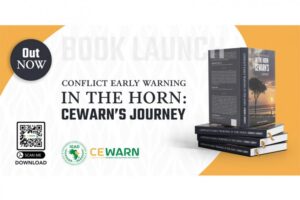CEWARN shares findings of assessment on efficacy of its early warning methodology
CEWARN held a virtual policy seminar on the assessment of the efficacy of CEWARN’s early warning methodology in anticipating violent conflicts. The seminar that was held on 21 October 2020 drew together Permanent Secretaries of foreign affairs of IGAD Member states; IGAD committee of Ambassadors as well as senior representatives of partner organizations including Amb. Parfait Onanga-Anyanga, UN Secretary General’s Special Envoy for the Horn of Africa.
The IGAD Executive Secretary Dr. Workneh in his opening remarks stated that since its establishment in 2002, CEWARN has grown into a robust mechanism that is able to deal with a broad scope of peace and security challenges. In its initial years, CEWARN had an exclusive focus on early warning for cross border pastoral conflicts in borderland regions of IGAD member states.
He stated that the assessment is timely and pertinent as strengthening regional cooperation in conflict prevention through early warning and response is a critical priority for IGAD. He said the need is currently more pronounced as the IGAD region’s peace and security challenges are compounded by multiple hazards including the COVID-19 pandemic, severe floods and desert locust invasion.
The CEWARN Director, Mr. Camlus Omogo presented the findings of the assessment on the efficacy of CEWARN’s early warning methodology that was conducted by using data sets from 2003-2015. He indicated that the assessment covered a retrospective review on whether CEWARN’s situation reports predicted incidents that were recorded in that period.
Mr. Omogo stated that the assessment yielded substantive evidence in support of the CEWARN Risk model while identifying areas for improvement. These include the need for greater investment in improving infrastructure and human resource capacity at the national level as well as achieving higher levels of consistency in field reporting.
CEWARN’s current scope of conflict early warning operation is organized under five sectors namely: economy, social affairs, security, governance and environment. CEWARN monitors developments in the region in each sector that impact regional peace and security.
Mr. Omogo stated that CEWARN’s current risk model is much more cutting age and supports: multi-dimensional and engendered situation analysis; monitoring and analysis of response intervention; identification of at risk groups as well as an integration of engendered groups at risk in every field situation assessment.
Please find a summary version of the assessment report here.
